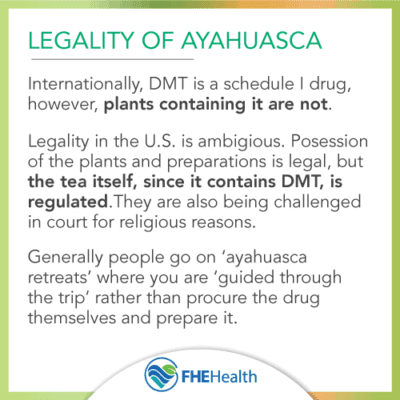Facing Legal Trouble: Ayahuasca Use in Hawaii Explained
The allure of ayahuasca, a powerful psychoactive brew traditionally used in indigenous Amazonian rituals, has spread far beyond its native lands. Hawaii, with its lush landscapes and spiritual openness, has become a location where individuals seek out this transformative experience. However, the legal landscape surrounding ayahuasca in the Aloha State is complex and often fraught with uncertainty. This article provides a comprehensive, informative, and neutral overview of the legal ramifications of ayahuasca use in Hawaii, helping you understand the potential risks and navigate this evolving terrain.
The Legality of Ayahuasca: A Complex Web
The legal status of ayahuasca in Hawaii is not straightforward. It hinges primarily on the substances that constitute the brew:
- DMT (Dimethyltryptamine): The primary psychoactive compound in ayahuasca is DMT. Under both federal and Hawaiian law, DMT is classified as a Schedule I controlled substance. This means it is considered to have a high potential for abuse and no currently accepted medical use.
- Banisteriopsis caapi (Ayahuasca Vine): The vine itself is not explicitly listed as a controlled substance in Hawaii. However, the legal implications are indirect. Because the vine is used to create a drink containing DMT, possession of the vine could be interpreted as intent to manufacture a controlled substance.
- Psychotria viridis (Chacruna Leaf): The leaf containing DMT is also not explicitly listed as a controlled substance but is illegal to possess or manufacture.
Key Legal Challenges:
- Possession: Possessing DMT or materials used to make it (like the Chacruna leaf) can lead to arrest and prosecution.
- Manufacturing: Preparing ayahuasca, even for personal use, may be considered manufacturing a controlled substance.
- Distribution: Selling or giving ayahuasca to others carries significant legal risks, potentially leading to felony charges.
- Religious Exemption: The gray area: Some individuals and groups attempt to claim religious exemptions under the Religious Freedom Restoration Act (RFRA). This law protects the free exercise of religion. However, the success of this claim depends on several factors, including the sincerity of the religious belief, the centrality of ayahuasca to the practice, and the government’s compelling interest in prohibiting the substance. The courts have historically been cautious in granting religious exemptions in drug cases.
Understanding the Potential Risks: Legal and Otherwise
Beyond the legal ramifications, it’s essential to understand the potential risks associated with ayahuasca use:
- Legal Consequences: Penalties can range from misdemeanor charges (for possession) to felony charges (for manufacturing or distribution), carrying potential prison sentences, significant fines, and a criminal record.
- Health Risks: Ayahuasca can trigger intense physical and psychological effects. Individuals with pre-existing mental health conditions, heart problems, or who are taking certain medications should avoid its use.
- Unpredictable Experiences: The experience can be profoundly transformative, but it can also be challenging and even traumatic. Set and setting play a crucial role, but even in a supportive environment, the experience can be overwhelming.
- Lack of Regulation: Unlike pharmaceuticals, ayahuasca brews are not regulated. The potency and purity of the brew can vary, increasing the risk of adverse effects.
- Ethical Considerations: Be mindful of the cultural context. Ayahuasca is a sacred medicine with deep roots in indigenous cultures. Consider the ethical implications of its use and the importance of respecting its origins.
Navigating the Legal Landscape: What to Consider
If you’re considering ayahuasca in Hawaii, it’s crucial to approach the situation with caution and awareness:
- Consult with a Legal Professional: Seek guidance from an attorney specializing in drug-related offenses in Hawaii. They can provide specific advice based on your situation.
- Research and Education: Thoroughly research the legal landscape and understand the potential risks.
- Prioritize Safety: If choosing to participate in an ayahuasca ceremony, ensure it is conducted by an experienced and reputable facilitator.
- Document Everything: If you are participating in a religious ceremony, document your practice as a record.
- Consider Alternatives: Explore other avenues for spiritual growth and personal transformation if the legal risks of ayahuasca are too great.
FAQs: Frequently Asked Questions
Here are some common questions about ayahuasca in Hawaii:
- Is it legal to buy ayahuasca in Hawaii? No, buying or selling ayahuasca is illegal under Hawaii and federal law due to the DMT content.
- Are there any exceptions for medical use? Currently, there are no legal exceptions for medical use of ayahuasca in Hawaii. Research into the potential therapeutic benefits is ongoing, but it is not yet a legally sanctioned treatment.
- Can I grow the ayahuasca vine in Hawaii? While the vine itself is not illegal, growing it with the intent to create ayahuasca may be interpreted as intent to manufacture a controlled substance, potentially leading to legal issues.
- What happens if I am caught with ayahuasca in Hawaii? The consequences will vary depending on the amount of the substance, your intent, and your prior criminal record. You could face misdemeanor or felony charges, potential jail time, and significant fines.
- Are there any legal ayahuasca retreats in Hawaii? The legality of ayahuasca retreats in Hawaii is highly questionable. Any retreat offering ayahuasca is operating in a legal gray area and could face prosecution.
Conclusion
The legal status of ayahuasca in Hawaii is complex and presents significant risks. While the allure of this powerful medicine is undeniable, individuals considering its use must carefully weigh the potential legal and personal consequences. Understanding the law, prioritizing safety, and seeking professional legal counsel are essential steps in navigating this challenging terrain. The future of ayahuasca use in Hawaii remains uncertain, and staying informed and making responsible decisions is crucial. Always prioritize your safety and well-being, and remember that the legal environment surrounding ayahuasca is constantly evolving.




